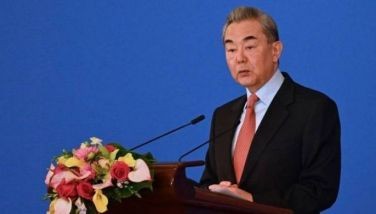Egypt warns all options open for Ethiopia Nile dam
CAIRO — Egypt's president warned yesterday that "all options are open" in dealing with Ethiopia's efforts to build a dam that threatens to leave Nile-dependent Egypt with a dangerous water shortage.
Speaking in a live televised speech before hundreds of his supporters, Mohammed Morsi said Egypt is not calling for war, but it is willing to confront any threats to its water security.
"Our blood is the alternative," Morsi said, and the crowd of largely Islamist supporters erupted in a standing ovation.
Morsi's speech reflected the importance of the Nile River to Egypt. It provides almost all of the fresh water to a country that is otherwise largely parched desert.
"We are not calling for war, but we will not allow, at all, threats against our water security," Morsi said before adding, "all options are open."
He did, however, note that Egypt considers Ethiopia a "friend" and that he has visited the country twice since taking office.
Morsi is facing growing dissent at home by a diverse spectrum of the population because of instability, poor security and a struggling economy more than two years after an uprising toppled longtime President Hosni Mubarak.
Opposition activists are hoping to harness the frustration of Egyptians into mass protests planned on the anniversary of Morsi's taking office June 30.
The president appeared to be using the concern about Ethiopia's Nile dam to whip up nationalistic fervor ahead of the protests. He said he would be willing to approach the opposition groups themselves to unite Egyptians around a common position with regard the dam.
"If Egypt is the Nile's gift, then the Nile is a gift to Egypt," he said.
"The great Nile is that which all our lives are connected to. The lives of the Egyptians are connected around it... as one great people," he added.
Angry Egyptian lawmakers accused the country's prime minister and government earlier in the day of doing nothing to prevent Ethiopia from building the dam. Prime Minister Hesham Kandil had just finished addressing parliament about how the government planned to work diplomatically, legally and technically to negotiate with Ethiopia over the dam when the session heated up.
Kandil called the dam's construction an "act of defiance" and stressed that Egypt will not give "a single drop of water," but then hurriedly left the chamber despite calls for clarification over how to handle the situation if Ethiopia rejects overtures.
"Egypt will turn to a graveyard" if the dam is completed, Egyptian lawmaker Khaled Ouda, a geologist, shouted to parliament. "The prime minister didn't provide anything."
The crisis started last month when Ethiopia diverted the flow of the Blue Nile, one of the Nile's sources, to make way for the dam, before a 10-member panel of experts from Egypt, Sudan, Ethiopia and other countries released a study on the dam's impact. The move took the Egyptian government by surprise. As much as 85 percent of the Nile's water comes from Ethiopia.
Egypt in the past has threatened to go to war over its "historic rights" to the Nile waters. Last week, Egyptian political leaders caused an uproar after proposing to aid rebels against the Ethiopian government or even sabotaging the dam itself. Ethiopia demanded an official explanation.
Egypt faces the prospect of its current water shortage worsening when the Grand Ethiopian Renaissance Dam is completed.
Ethiopia's unilateral action appeared to ignore the 10-nation Nile Basin Initiative, a regional partnership formed in 1999 that seeks to develop the river in a cooperative manner.
- Latest
- Trending


























